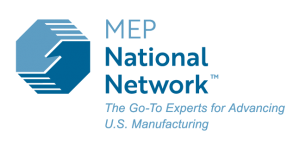Arkansas Economic Development Commission Manufacturing Solutions (AEDC-MS) was established in 1995 and is a program of the Arkansas Economic Development Commission. AEDC-MS is an affiliate of the National Institute of Standards and Technology (NIST) Manufacturing Extension Partnership (MEP).
MEP Background
Program History
- Established 1988 – Omnibus Trade and Competitiveness Act of 1988, reauthorized and reformed in
 1998, 2007, 2011, and most recently in bi-partisan American Innovation and Competitiveness Act of 2016.
1998, 2007, 2011, and most recently in bi-partisan American Innovation and Competitiveness Act of 2016. - Provide assistance for creation and support of manufacturing extension centers to enhance competitiveness, productivity, and technological performance in United States manufacturing
- Federal government contributes maximum of 50% of costs of operations, remainder is provided by firms paying for services and contributions from some states
- In FY 2016, MEP’s $130 million appropriation was matched by $72.3 million in private funds (fees for services), $43.5 million in state and local contributions, and $44.1 million in other contributions.
Mission
Objectives of centers include:
- Transfer of manufacturing technology and techniques
- Efforts to make new manufacturing technology and processes usable by SMEs
- Active dissemination of scientific, engineering, technical, and management information about manufacturing to industrial firms
- Provide information about job skills needed in manufacturers to community colleges and area career and technical education schools grow employment and wages at United States-based SMEs
Rationale
- Over 292,000 manufacturing establishments currently
- 99% under 500 employees (almost 290,000 establishments)
- Comprise 73.9% of manufacturing employment (8.3 million workers)
- SMMs (small and medium sized manufacturers) form the base of U.S. supply chains – essential platform for manufacturing resurgence.
- OEMs have no economic incentive to invest in their supply chains, because a single firm cannot capture the full value of its investment. This results in a sub-optimal allocation of resources to the SMM sector, producing a classic “market failure,” justifying public intervention.
- Economics of for profit private consulting market prevents serving SMMs.
- Congress recognized the need for public support of SMM manufacturing firms in its intentional and continuous nearly 30 year support of the MEP program, which is uniquely dedicated to provide assistance to rural, start-up, very small and other hard to reach firms, and services in workforce development, technology transfer and supply chain upgrading.
Operations
- Centers (51) managed by non-federal, non-profit organizations, state agencies or universities in each State and Puerto Rico
- Employ close to 1300 technical experts in 600 locations with over 2500 partners to deliver services
- Governed by private sector-led Boards, comprised of 600 representatives of manufacturers, trade associations, education and training organizations, and states.
- Program services
- Cost reduction (lean, energy efficiency, business process optimization)
- Increase sales (innovation & diversification, exporting, sales/marketing strategies)
- Improve quality (ISO standards, six sigma, continuous improvement)
- Workforce (training, management development, change management)
- Information technology (system selection, cybersecurity)
- Supply chain (inventory management, supplier quality systems and value chains)
- Strategic growth (CEO peer groups, family business advisor, strategy/financial plans)
- From 2014-2017, NIST conducted a comprehensive nation-wide competition to select the most capable management organization in each State
- Winning proposals demonstrated significant creativity in strategic focus, including new programs, greater local board accountability, increased non-federal support
- Awards are for long-term institutional support, five-year awards renewable for additional five years, subject to close monitoring and periodic evaluation
Performance
- Annually reaches 25,000 SMEs and provides intensive fee-based services to 8,000 firms.
- Independent private sector firm directly surveys MEP clients quarterly to determine impacts and attitudes quarterly. FY 2016 Impacts:
- $9.3 Billion in new/retained company sales
- $3.5 Billion in new investments in by companies
- $1.4 Billion in cost saving
- 86,602 jobs created/retained
- Upjohn Institute study (2017) of effects of MEP projects on the U.S. economy
- FY 2016 investment in MEP generated nearly a nine-fold increase in federal personal income tax, an 8.7:1 return
- Model forecasts 142,000 additional jobs, a $15.4B increase in GDP, and a $1.13B return to the Treasury during FY2016 using conservative discounted assumptions
- Top reasons why companies work with MEP Centers
- Expertise of staff
- Cost of service
- Fair service
- Knowledge of industry
- Reputation for results
- Net promoter score – 79.8
